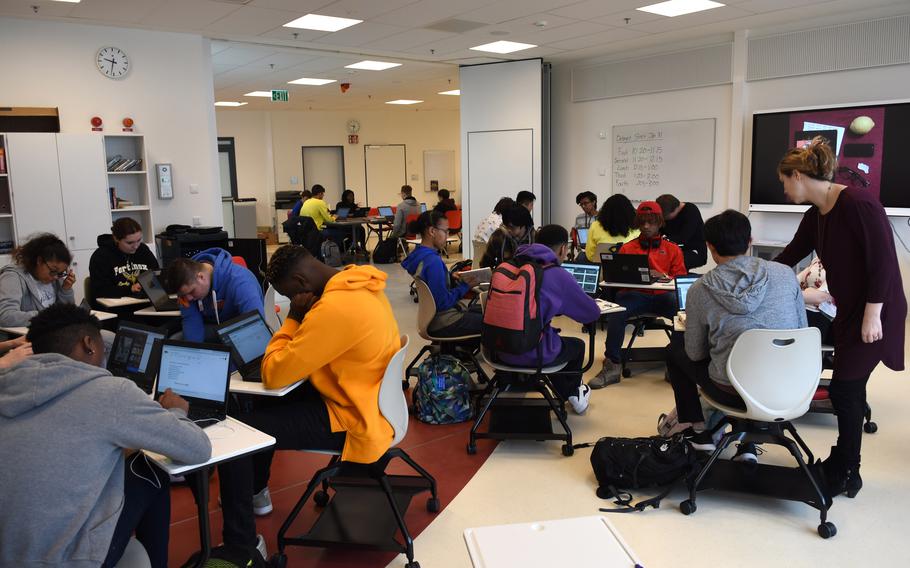
A Department of Defense Education Activity-Europe high school classroom. DODEA school counselors, psychologists and support staff say they do not have enough time or resources to help a growing number of students with mental health issues, according to a new Government Accountability Office report. (Jennifer H. Svan/Stars and Stripes)
KAISERLAUTERN, Germany — Counselors and psychologists at Defense Department schools say they are overwhelmed by a surge in student mental health concerns — especially suicidal behavior — due to staffing shortages, administrative burdens and unclear guidance, a federal watchdog agency report says.
The Government Accountability Office found that 1 in 50 students at Department of Defense Education Activity schools was assessed for suicide risk in each of the past two school years, according to a report released Wednesday.
Staff at all 27 DODEA schools visited by the GAO said students were experiencing “unprecedented and increasing levels of mental health concerns,” including rising rates of self-harm, depression and anxiety.
GAO auditors conducted the review between January 2024 and May 2025, visiting 11 military installations in the U.S., Europe and the Pacific.
They interviewed school principals, assistant principals, psychologists, counselors, nurses, DOD-sponsored mental health providers, parents and behavioral health professionals.
The review was mandated by the 2024 National Defense Authorization Act in response to reports of worsening mental health among K-12 students nationwide since the COVID-19 pandemic.
Military-connected children face unique stressors, the GAO noted, but “less is known about the effectiveness of DOD’s efforts to meet the mental health needs of the more than 65,000 military-connected children.”
“Without ensuring that it has the right mix of resources to address DODEA students’ mental health needs, DOD may fall short of meeting service member families’ needs, potentially harming mission readiness,” the report stated.
DODEA recently launched a program to help schools identify student needs and build resilience, but school leaders haven’t evaluated whether they have enough staff to carry out those goals, the GAO found.
School psychologists and counselors said they are significantly understaffed and often unable to support students who aren’t in immediate crisis.
One psychologist reported that she couldn’t conduct weekly check-ins with a student who had recently attempted suicide.
Staff at 24 of the 27 schools cited DODEA’s high student-to-psychologist ratio as a key constraint. DODEA has 1 psychologist per 832 students, the GAO found.
While this surpasses the public school average of 1:1,065, it falls short of the National Association of School Psychologists’ recommended 1:500 ratio — a standard DODEA claims to follow, according to the report.
In addition to staffing shortfalls, school psychologists and counselors described being burdened by duties like coordinating standardized testing.
Counselors at two schools said they were largely unavailable to students during April and May due to intensive testing schedules.
DODEA headquarters officials acknowledged that standardized testing duties are not an ideal use of school counselors’ expertise.
However, current policy leaves such staffing decisions up to individual schools and doesn’t discourage the practice, the report said.
Parents also told the GAO that counselors and psychologists lacked time to meet their children’s needs.
DODEA relies on three Pentagon-sponsored programs for student mental health support: Military Family Life Counseling, Adolescent Support and Counseling Services and the School Behavioral Health Program.
But their reach is limited. There are just 206 Military Family Life Counselors and 25 Defense Health Agency clinicians across all DODEA schools.
Pentagon officials have never evaluated the effectiveness of these programs, despite policy requiring such reviews, according to the report.
Staff at most schools also said they were unclear on how to refer students to Military Family Life Counselors or expressed hesitation in doing so.
At 10 schools, MFLC counselors wouldn’t share with staff how they were supporting the students, further complicating coordination.
The GAO recommended that the Defense Department direct DODEA to assess its workforce capacity and develop guidance discouraging the assignment of school counselors to standardized testing duties. It also called on DOD to evaluate its school-based mental health services.